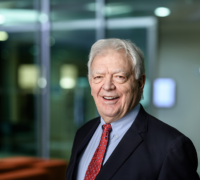
This much I know: 9 leadership lessons from global CEOs
From absorbing stress to finding your authentic voice, nine leaders of global companies share the wisdom that has helped them excel in their roles. ...

by George Kohlrieser Published February 1, 2022 in Brain Circuits • 3 min read
There is a difference between an adversary and a difficult person. An adversary acts directly or indirectly to block your success, whereas a difficult person is someone who has traits or characteristics that make it difficult, if not impossible, to communicate with them. Knowing the difference, even if behaviors overlap, is very important to understand their underlying motivation. All behavior has a purpose. It is crucial to make an effort to objectively identify what a person’s purpose is. Remember – the goal of an adversary is to block your path and impede your success.
The motivation of an adversary falls into three areas: focused, emotional, or revengeful. When clashing with a team member or colleague whose interests may not be aligned with yours, it is important to learn how to work with them. Everyone needs this skill, especially leaders. Here’s the good news – it is a skill that can be learned.
What to do
The human brain is a social brain, and it wants to build relationships. We are social in nature, and we thrive with bonding. The key is to connect with the other person about something they need, or something that matters to them. You do not have to like somebody to form a bond with them.
This is the one thing that is difficult for many people to do – bond with someone you do not like. As a hostage negotiator, I talked with people who had done despicable things or had extremely repulsive ideas. It was necessary to find a way to connect and form a bond with them in order to negotiate for the release of the hostages.
The same principles apply in business. You don’t have to like or even respect the behavior of the other party to create a bond with them. And the way you do this is by finding common ground.
The exercise
Think about a person you need to resolve a conflict with and write down what your goals are and what goals you have in common. Then write down what you want and what you think the other person wants. If you do not know what the other person wants, prepare the questions you can ask them to find out. Then use your mind’s eye to picture what a successful relationship with that person would look like. See yourself approaching that person and what you would say or the questions you would ask.
Finally, find the courage to go and to do it!

Distinguished Professor of Leadership and Organizational Behaviour at IMD
Professor of Leadership and Organizational Behavior at IMD and Director of the High Performance Leadership program, the Advanced High Performance Leadership program, and the Inspirational Leadership program. He serves as a consultant to several global companies including Accenture, Amer Sports, Borealis, Cisco, Coca-Cola, HP, Hitachi, IBM, IFC, Jaeger-LeCoultre, Morgan Stanley, Motorola, NASA, Navis, Nestlé, Nokia, Pictet, Rio Tinto, Roche, Santander, Swarovski, Sara Lee, Tetra Pak, Toyota, and UBS.

July 10, 2025 • by Jean-François Manzoni in Brain Circuits
From absorbing stress to finding your authentic voice, nine leaders of global companies share the wisdom that has helped them excel in their roles. ...

July 8, 2025 in Brain Circuits
According to the World Health Organization, depression and anxiety cost the global economy $1tn each year, predominantly from reduced productivity. Here are six simple habits, taken from design thinker Vishakha Singh’s SHIFT...

July 4, 2025 • by Rachel Polla in Brain Circuits
How many times did I secretly wish for my father to leave the business and leave me the sole “Queen” on board? Ten years later, I cannot imagine working without him by...

July 3, 2025 • by Eric Quintane in Brain Circuits
Entrepreneurial talent who work with other teams often run into trouble with their managers. Here are ways to get the most out of your ‘boundary spanners’...
 Audio available
Audio availableExplore first person business intelligence from top minds curated for a global executive audience